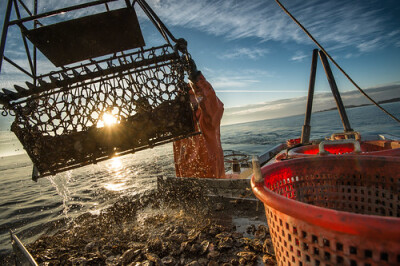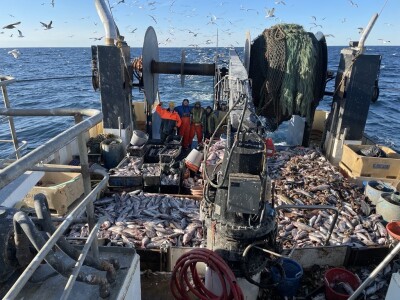Reel doses of reality
It's funny how things happen at once. This fall I received three new films on DVD, each with a different perspective on struggles within fishing communities.
What's important about these efforts is that they're all geared toward mainstream audiences, who benefit all too rarely from such insights.
Two are documentaries, the third is a feature film. All share the theme of confronting change, although "Islander," the movie, is much more about change from within, as opposed to the documentaries, in which change is an external force.
Matt Barr, an associate professor in the Department of Broadcasting and Cinema at the University of North Carolina at Greensboro, conceived "Wild Caught: The Life and Struggles of an American Fishing Town" as a celebration of a small town and its independent people.
But during the years (1999-2005) he spent filming the story of Sneads Ferry, N.C., population 2,200, he watched as shrimp prices declined and developers bought up waterfront property. He saw fish houses sold and witnessed the marginalization of a way of life that had sustained the community for 300 years.
The film is long by documentary standards — 90 minutes — but Barr uses the time economically, taking viewers to sea with the fishermen of Sneads Ferry and introducing the audience to the fishermen's families and neighbors.
Although Barr narrates "Wild Caught," he allows the community of Sneads Ferry to tell its story in a haunting collage of voices.
Barr has yet to secure a distribution deal for "Wild Caught," but he is making the rounds of festivals and showing the film to as many interested folks as he can. In the meantime, you can learn more about "Wild Caught," view a trailer and purchase it at www.unheardvoicesproject.org. The price is $25 including shipping.
Clearly, this was never about the money.
To catch "A Fish Story," you need only tune into PBS, which will premiere the one-hour documentary Jan. 2 on its award-winning program Independent Lens. (Check your local listings!)
"Fish Story" chronicles the relationship between environmentalists and the groundfish fishermen of New England. The relationship began as an alliance, in the 1970s, when the Conservation Law Foundation fought to keep oil rigs off Georges Bank, but became adversarial a generation later when the CLF sued NMFS to end overfishing.
The years of change are seen through a prism held to light by community activists Angela Sanfilippo of Gloucester, Mass., and Shareen Davis of Chatham, on Cape Cod, both of whom were born into fishing families.
Like Barr, filmmakers Courtney Hayes of Gloucester and Tim Gallagher of Boston emphasize community and tradition. It's not lost on them, however, that New England fish stocks were plundered by foreign vessels until the 200-mile limit became law, at which point our national objective became overcapitalizing the U.S. fleet.
Although most of us know how this story turns out, it does not suffer in the retelling. Some may find it hard to watch. "How could we have let this happen?" you'll ask.
But what else could we have done?
In the interest of full disclosure, "Islander" was written and produced by Thomas Hildreth, whose father, Horace Hildreth Jr., is chairman of the board of Diversified Communications, which publishes National Fisherman.
I'd have watched it anyway. It's about a lobsterman involved in an accidental shooting over territory. Territory is the foundation of Maine's lobster fishery, in which I got my start as a boy.
Sent to jail for five years, Eben Cole returns home to find himself unwelcome and out of business, his wife and daughter now part of another lobsterman's family.
The irony of Cole's plight reels us in: A member of that most territorial species, the Maine lobsterman, finds himself an outsider on the island of his birth, resisted almost as forcefully as he resisted the mainlander who provoked his tragic mistake.
What the movie lacks in unyielding environmentalists and greedy developers it makes up for in its portrayal of a community as the place where we see ourselves. "I don't know if I'll ever get it back the way it was," Cole, who is played by Hildreth, laments to Popper, an older lobsterman portrayed by Philip Baker Hall.
"It's never going to be the way it was," Popper tells him. "It's not meant to be."
Cold comfort, indeed.
Although distribution is still being finalized, "Islander" will open March 9 at Boston's Kendall Square Cinema. For more information, visit www.islanderthemovie.com.






